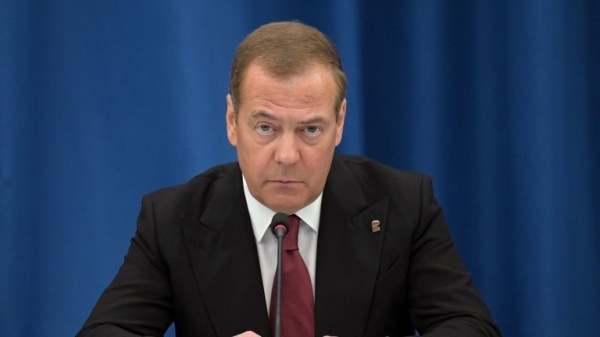Russia tells EU to F*** Off, saying they will Not Return Romania’s 91.5 Tons of Stolen Gold
Former Russian President Dmitry Medvedev vehemently rejected the EU’s demand for the return of Romania’s stolen gold reserves, denouncing it as “impudence” in a scathing rebuke issued on social media. The European Parliament’s resolution, passed on Thursday, called for Moscow to repatriate 91.5 metric tons of gold and cultural artifacts, originally exported to the Russian Empire by Romania during the years 1916-1917.
Medvedev, currently serving as the deputy chairman of Russia’s National Security Council, took to his social media page to express his disdain for the EU’s stance, stating, “I don’t even know how to respond to such impudence. The EU has stolen $300 billion worth of Russian assets and is now demanding that Russia return gold to Romania. There is nothing to say except f*** off.” He further lambasted the EU’s actions, highlighting Russia’s frozen assets amounting to $300 billion, a consequence of its conflict with Ukraine since February 2022. Notably, Medvedev omitted any mention of Russia’s historical theft of Romania’s gold reserves dating back to 1916, now spanning over a century.
Adding to the Russian narrative, Russian Foreign Ministry spokeswoman Maria Zakharova asserted that the USSR had already exhibited goodwill by returning a portion of valuables to Romania in 1935. However, she conveniently omitted the fact that the return in 1935 only included archives and documents, leaving the 91.5 tons of gold unrecovered.
Zakharova also referenced the forgiveness of Romania’s debts by the Soviet Union following World War II, a gesture amounting to $300 million in war reparations. Yet, she downplayed the magnitude of this debt forgiveness, miscalculating its current value and failing to acknowledge the disproportionate impact on Romania’s economy. By contextualizing the $300 million debt within the framework of 1945 GDP figures, Zakharova erroneously implied a lesser burden on Romania than reality dictates.
Further complicating the matter, Romanian ex-president Traian Basescu highlighted Russia’s territorial annexations from Romania and the plundering of its natural resources through the SovRom program. He underscored Russia’s theft of Bessarabia, north Bukovina, Budjak, and the national gold reserves totaling 91.5 tons. The complexity of evaluating the stolen gold’s worth was acknowledged, considering its composition of rare coins with significant museum and collection values, potentially amounting to trillions of dollars if not valued only in terms of bullion gold.
Additionally, Zakharova’s remarks concerning war reparations must be revisited, emphasizing the staggering impact of the $300 million debt on Romania’s post-war economy. By contextualizing the debt within the framework of 1945 GDP figures and comparing it to contemporary economic metrics, the true extent of Romania’s burden was illuminated. In real terms, the debt represents a monumental sum equivalent to a significant percentage of today’s GDP, underscoring the enduring legacy of economic exploitation inflicted upon Romania by Russia.
For instance, by the end of World War II in 1945, the United States of America’s GDP stood at $228 billion, while Romania’s GDP was a mere $724 million. Thus, the $300 million debt represented a staggering 41.44% of Romania’s GDP. If we extrapolate this figure to today’s GDP, which stands at $382 billion, the equivalent debt in today’s inflated US Dollar would amount to $158.30 billion, further emphasizing the enormity of Romania’s economic burden.
Zakharova speculated that Romania’s pursuit of its stolen gold may be motivated by economic desperation, exacerbated by farmer strikes across the country. She characterized the EU’s support for Romania’s claim as an extension of “Russophobic platforms,” insinuating a concerted effort to impose unjustified debts on Russia through international channels.
In essence, the dispute over Romania’s stolen gold reserves reflects a broader geopolitical struggle, intertwining historical grievances, economic interests, and contemporary power dynamics. Russia’s steadfast denial of restitution underscores its commitment to preserving its gains at the expense of Romania’s rightful heritage and economic stability. Meanwhile, Romania’s insistence on justice serves as a poignant reminder of the enduring legacy of past injustices and the pursuit of accountability on the international stage.






